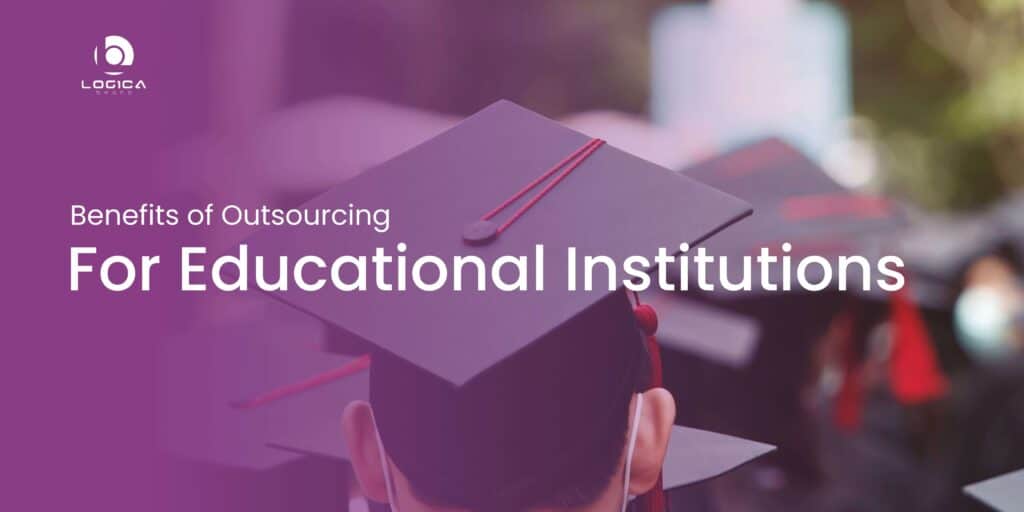Outsourcing is a growing trend in the education industry, with many educational institutions seeing the benefits of partnering with outside companies for certain services. By partnering with outside companies, educational institutions can access specialized skills, resources, and technologies, while also reducing costs and increasing efficiency.
In this blog, we will take a deep look into the benefits of outsourcing for educational institutions, and explore some of the key considerations and best practices for making the most of this strategy. Whether you are looking to streamline operations, enhance the students experience, or stay ahead of the curve in a rapidly evolving education landscape, outsourcing may be the solution you need.
Outsourcing for educational institutions
Outsourcing has become increasingly popular in recent years, as it offers businesses a number of advantages. Not only is outsourcing more cost-effective, but it also allows businesses to focus on their core operations while outsourcing companies take on many of the time-consuming day-to-day tasks. As a result, outsourcing has become a core competent of many businesses strategies.
Outsourcing for educational institutions has become critical aspect of modern education, with many educational institutions recognizing the advantages of partnering with outside companies to meet their goals. The world of education is constantly changing, and educational institutions are facing new challenges and opportunities on a daily basis. From rising costs and declining funding to the need for new technologies and innovative pedagogical approaches, educational institutions must find ways to stay ahead of the curve.
Benefits of outsourcing for educational institutions
Outsourcing is a strategy that has become popular in various industries including education industry. By outsourcing certain functions, educational institutes can reap several advantages, including cost savings, increased efficiency, access to expert resources, flexibility and improved quality.
This approach allows educational institutions to concentrate on their core missions, reduce operating costs, and provide high-quality services to the students. Outsourcing can provide educational institutes with the resources and expertise they need to improve educational outcomes and meet the changing needs of students in today’s rapidly evolving educational landscapes.
There are several benefits of outsourcing for educational institutions which includes:
Access to specialized expertise
By outsourcing for educational institutions, the educational institutions can get access to specialized expertise, such as tutoring services for struggling students, data analysis, and assessment services to track students’ progress.
Improved operational functions
Outsourcing non-core functions, such as technical support and maintenance, schools can free up time and resources for in-house staff, enabling them to focus on their core responsibilities and improve overall operational efficiency. Outsourcing non-core functions, such as technical support, maintenance, and administrative tasks, schools can free up staff time and resources and improve overall operational efficiency. Outsourcing providers often have specialized knowledge and experience in these areas, which can result in more effective and efficient delivery of services compared to in-house staff.
Increased access to resources
Outsourcing for educational institutions can provide the institutions with access to a wider range of educational resources, such as e-books, educational software, and training programs, to support student learning.
Outsourcing for educational institutions can also provide schools with access to specialized training and professional development programs, which can help teachers and staff to improve their skills and knowledge. This can have a positive impact on student learning outcomes, as teachers are better equipped to support student learning.
Reduced workload
Outsourcing for educational institutions can help institutions to reduce the workload of in-house staff, allowing them to focus on delivering quality education to students. This can improve job satisfaction among staff, as they are able to concentrate on the tasks that they are best suited to and enjoy the most.
Outsourcing for educational institutions can also help schools to alleviate staffing shortages, as it provides access to a larger pool of specialized skills and expertise. This can help schools to continue delivering high-quality education to students even during periods of high demand.
Cost savings
Outsourcing for educational institutions can also help institutions in cost savings, as it eliminates the need for schools to invest in and maintain expensive equipment and technology. Outsourcing providers often have economies of scale that allow them to deliver services at a lower cost than would be possible in-house.
Improved focus on core mission
When schools focus on their core mission, they can provide students with a more comprehensive education that is better aligned with the school’s values, goals, and mission. This can lead to improved student learning outcomes, a more engaged student body, and a more positive school culture.
Better use of technology
Outsourcing providers often invest in technology and tools that enhance their services, and educational institutions can benefit from these investments. There is a vast impact of technology on outsourcing for educational institutions. By outsourcing services such as technical support, maintenance, or administrative tasks, schools can gain access to the latest technology and tools without having to make a large investment themselves.
Outsourcing can provide educational institutions with access to the latest technology and tools, which can help schools to improve the education experience for students, streamline processes, and enhance the quality-of-service delivery.
Along with the benefits there are few challenges associated with outsourcing for educational institutions.
Quality control
Quality control is a concern when outsourcing for educational services as outsourcing providers may have different standards, processes, or quality control measures in place. This can result in inconsistencies in quality or service delivery, which can have a negative impact on the education experience for students.
Managing expectations
Managing expectations is also a challenge while outsourcing for educational institutions, as it is important to define clear expectations for outsourcing providers and ensure that they deliver services in line with these expectations. Misaligned expectations can result in disappointment or dissatisfaction on both sides, which can impact the quality-of-service delivery and the overall outsourcing relationship.
Cultural fit
Cultural fit is an important factor to consider when outsourcing for educational institutions. It is important to choose outsourcing partners that align with the school’s values, goals, and mission, as misaligned cultures can result in conflicts and challenges in managing the outsourcing relationship.
By choosing outsourcing partners that align with the school’s values, goals, and mission, schools can help to ensure a successful outsourcing relationship and reduce the risk of conflicts or challenges.
Is outsourcing for educational institutions a beneficial strategy?
For educational institutions, outsourcing can have a variety of advantages, such as less work for internal personnel, enhanced operational effectiveness, easier access to learning materials, and a sharper focus on the primary goal of delivering high-quality education. Schools can gain from outsourcing providers’ frequent investments in tools and technology that improve their services.
However, there are other difficulties with outsourcing as well, including quality control, expectations management, cultural fit, and the requirement to thoroughly assess outsourcing companies to make sure they are consistent with the school’s beliefs, objectives, and mission.
If educational institutions thoroughly assess possible outsourcing providers and successfully manage the outsourcing partnership, outsourcing can be a successful strategy. Schools can boost operational effectiveness, expand access to educational resources, and decrease the strain for in-house employees by outsourcing non-core services and concentrating on their primary objective of providing quality education.
To establish a successful outsourcing engagement and accomplish their intended outcomes, schools must consider the advantages and disadvantages of outsourcing and select outsourced partners that share their values, objectives, and mission.
Conclusion
For educational institutions aiming to enhance their operations and give students a more thorough and effective education, outsourcing might be a useful solution. Schools can lessen the strain of internal personnel, improve access to educational materials, and concentrate more on their primary objective of providing high-quality education by outsourcing non-core services.
However, it’s important to carefully evaluate potential outsourcing providers and manage the outsourcing relationship effectively. Quality control, managing expectations, and cultural fit are among the challenges that must be considered when outsourcing services.










